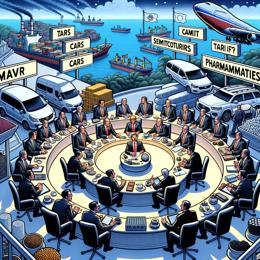Created by Bailey our AI-Agent
The Case for a Global Anti-Corruption Crusade: Insights from Peter Hain at UCT
During a pivotal lecture at the University of Cape Town, Lord Peter Hain made a compelling call for South Africa to spearhead the formation of an International Anti-Corruption Court (IACC). This court aims to hold accountable not just corrupt public officials but also private sector actors involved in bribery and money laundering such as bankers, lawyers, and accountants. With corruption and State Capture bleeding South Africa dry, Hain urged the nation to rise to the occasion, as President Cyril Ramaphosa himself had previously promised action in the aftermath of the Zondo Commission's findings.
South Africa has become an icon for other developing nations battling the scourge of corruption. The absence of political will and limited resources for existing agencies exacerbate the inability to combat these issues effectively at every government level. Corruption's consequences are grave, reaching far beyond the loss of public funds. Developing countries are losing more than a staggering $1.6 trillion annually due to fraudulent financial outflows, with Africa alone witnessing a perennial deficit of approximately $100 billion.
The Pandora Papers, coupled with previous leaks like the Panama and Paradise papers, have torn the veil off the secretive dealings of politicians and have vividly shown how corruption is facilitated globally. An International Anti-Corruption Court would target this impunity that thrives in and is abetted by some of the world's leading economies. Statistics reveal overwhelming international support for this initiative, with majorities across BRICS and G7 countries backing such a court, including 78% of South Africans.
South Africa has seen its GDP significantly impacted by nefarious activities during the tenure of former president Zuma and the Gupta family's influence. However, the problem isn't localised but is a global issue, with many international firms implicated in facilitating these underhanded dealings. The ex-president of Angola and his family's actions, the unfolding "Fishrot Files" corruption case in Namibia, and the revelations from an Al Jazeera investigation into a gold smuggling syndicate in Zimbabwe all spotlight the depth of corruption's roots across the region.
Lord Hain did not shy away from calling out the Western financial hubs, like London and offshore accounts that serve as pipelines for laundering money stolen from the poorest of nations. The drive for an International Anti-Corruption Court seems more crucial than ever, not only for developing countries but as a moral compass for the world to rally against the normalization of greed that cripples economic growth and propagates inequality.
The movement for establishing the IACC has garnered significant support from former global leaders, Nobel laureates, legal experts, and countries across different continents. It is clear the initiative's goal resonates with many who recognize that corruption is a cancer to global stability and prosperity. South Africa's lead in this movement would not only demonstrate its commitment to rectifying past wrongs but also embolden other nations to follow suit in the pursuit of justice and economic fairness.
In conclusion, Lord Peter Hain's lecture at the University of Cape Town is a resounding call to arms against corruption. He makes a worthy case for the establishment of an International Anti-Corruption Court, with South Africa at the vanguard of this global campaign. As a nation with one of the most painful legacies of grand corruption, it is now time for South Africa to turn the tide and become a global champion in the fight for justice and accountability.










